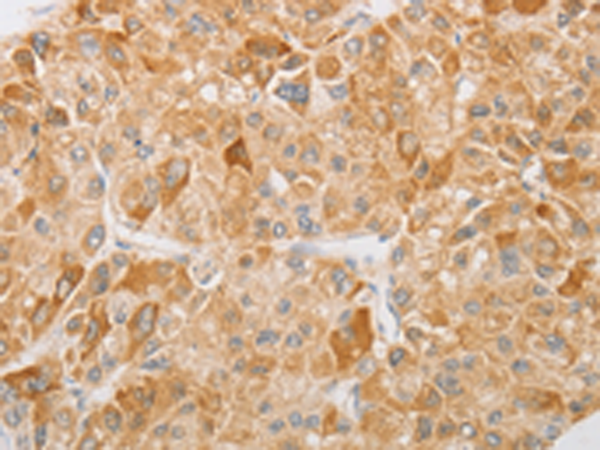
| WB | 咨询技术 | Human,Mouse,Rat |
| IF | 咨询技术 | Human,Mouse,Rat |
| IHC | 1/50-1/200 | Human,Mouse,Rat |
| ICC | 技术咨询 | Human,Mouse,Rat |
| FCM | 咨询技术 | Human,Mouse,Rat |
| Elisa | 1/1000-1/5000 | Human,Mouse,Rat |
| Aliases | NGFB; HSAN5; Beta-NGF |
| Host/Isotype | Rabbit IgG |
| Antibody Type | Primary antibody |
| Storage | Store at 4°C short term. Aliquot and store at -20°C long term. Avoid freeze/thaw cycles. |
| Species Reactivity | Human, Mouse, Rat |
| Immunogen | Fusion protein of human NGF |
| Formulation | Purified antibody in PBS with 0.05% sodium azide and 50% glycerol. |
+ +
以下是3-4条关于NGF抗体的参考文献及其摘要内容的简要概括:
1. **文献名称**:*Tanezumab for the Treatment of Pain from Osteoarthritis of the Knee*
**作者**:Lane NE 等(2010)
**摘要**:该临床试验评估了抗NGF单克隆抗体Tanezumab治疗膝骨关节炎疼痛的效果。结果显示,与安慰剂相比,Tanezumab显著缓解疼痛并改善关节功能,但部分患者出现快速进展的骨关节炎副作用。
2. **文献名称**:*Anti-Nerve Growth Factor Antibody Abolishes Inflammatory Pain in Rats*
**作者**:Mantyh PW 等(2011)
**摘要**:研究通过动物模型验证了抗NGF抗体对炎症性疼痛的抑制作用,证实其通过阻断NGF与TrkA/p75受体结合,减少外周和中枢敏化,为慢性疼痛治疗提供机制依据。
3. **文献名称**:*Nerve Growth Factor Antibody Induces Cholinergic Neuronal Degeneration in Alzheimer's Disease Models*
**作者**:Capsoni S 等(2000)
**摘要**:实验发现,抗NGF抗体在阿尔茨海默病转基因小鼠中引发基底前脑胆碱能神经元退化,提示NGF信号缺失可能加剧神经退行性病变,需谨慎评估抗体治疗的潜在风险。
4. **文献名称**:*Safety of Anti-NGF Antibodies in Clinical Trials: Sympathetic Nervous System Dysfunction*
**作者**:Rukwied R 等(2013)
**摘要**:分析多项临床试验数据发现,部分接受抗NGF治疗的患者出现交感神经功能障碍(如血压异常、体温调节受损),提示需进一步优化抗体安全性。
这些文献涵盖抗NGF抗体的治疗应用、机制研究及安全性问题,涉及疼痛管理、神经退行性疾病和副作用评估。
**Background of NGF Antibodies**
Nerve Growth Factor (NGF), a neurotrophic protein discovered in the 1950s, plays a critical role in the development, survival, and function of sensory and sympathetic neurons. It binds to tropomyosin receptor kinase A (TrkA) and the p75 neurotrophin receptor, regulating pain signaling, tissue repair, and inflammatory responses. Dysregulation of NGF is linked to chronic pain conditions (e.g., osteoarthritis, neuropathies) and inflammatory diseases.
NGF antibodies, developed as therapeutic agents, aim to inhibit NGF activity, thereby reducing pain and inflammation. Unlike traditional analgesics (e.g., opioids), these biologics target the underlying pathophysiology with potentially fewer systemic side effects. Monoclonal antibodies like tanezumab have shown efficacy in clinical trials, though safety concerns (e.g., joint damage) have prompted cautious optimization.
Research continues to explore their applications in cancer pain, diabetic neuropathy, and neurodegenerative disorders. Challenges include balancing therapeutic benefits with risks and understanding long-term effects. NGF antibodies represent a promising, targeted approach in pain management, reflecting advances in precision medicine and neuroimmunology.
×